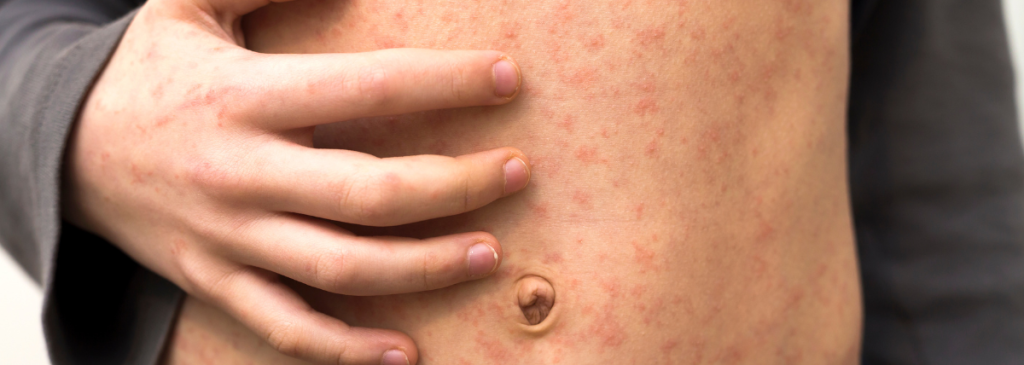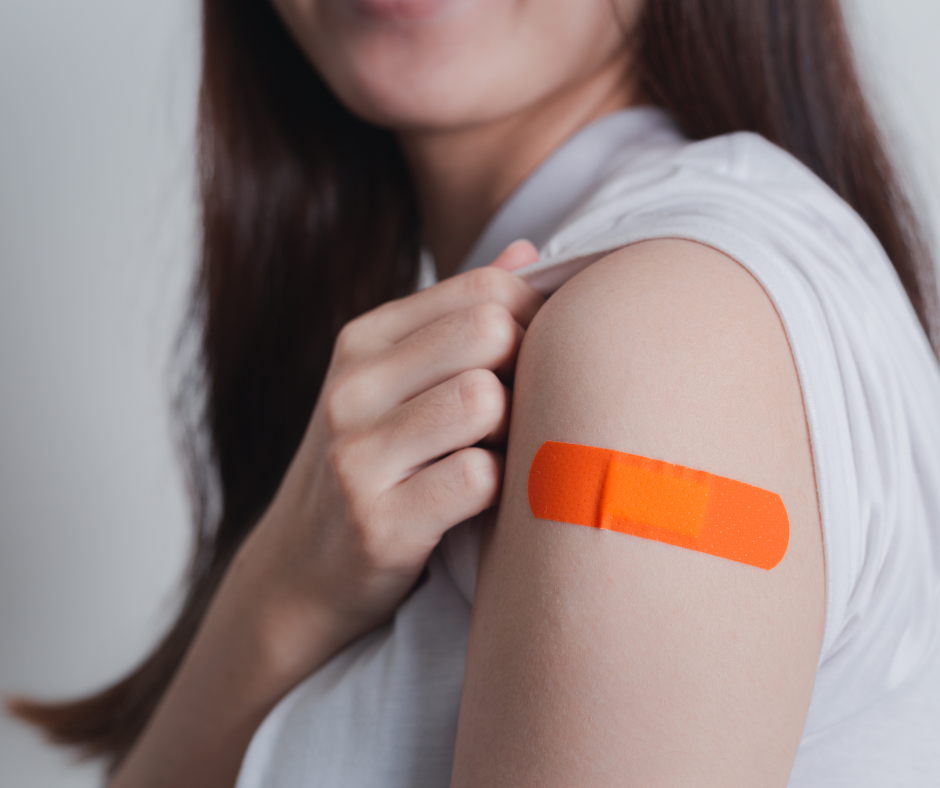- Home
- Health Topics
- Measles
Measles

What is Measles?
Measles is a highly contagious infection caused by the measles virus.
Measles spreads easily through the air. It is passed in tiny droplets when an infected person coughs, sneezes, or breathes. It can survive in the air for up to two hours.
A person with measles can spread the infection to others four days before to four days after the rash starts.
Signs and Symptoms
Symptoms of measles can develop 7 to 21 days after exposure to the virus. If you have had contact with someone who has been diagnosed with measles, it is important to monitor for symptoms for 21 days after your last exposure.
People infected with measles can spread the virus to others before they have symptoms.
Symptoms include a high fever, runny nose, cough, drowsiness, irritability and red eyes.
Small white spots may appear in the mouth and throat.
A red blotchy rash begins to appear on the face 3 to 7 days after the start of symptoms, then spreads down the body to the arms and legs. This rash usually lasts 4 to 7 days.
Most people fully recover from measles within 2 to 3 weeks if they do not develop complications.
Most complications of a measles infection are rare, but they can be dangerous. They can include ear infections, pneumonia and, in some rare instances, brain swelling and even death.
People at greatest risk for complications related to measles are unvaccinated infants, unvaccinated pregnant people, and people who are immunocompromised.
Prevention
The best protection against measles is vaccination. The vaccine is safe and effective.
In Ontario, the measles vaccine is combined with the mumps and rubella (MMR) vaccine.
Two doses of measles vaccine are required and provide lifelong protection against measles.
Book a measles vaccine appointment
View or submit your child’s immunization records
What should I do if I have symptoms of measles?
If you or your child are experiencing measles symptoms, stay home and contact your healthcare provider immediately to discuss follow-up recommendations.
Do not attend work, school, public places or social activities.
There is no specific treatment or medication for a measles infection. Any treatment provided is meant to relieve symptoms and to prevent severe complications.
Before visiting a health care provider or emergency department, call ahead to let them know you might have measles. They will take appropriate precautions to prevent the spread to others as soon as you arrive.
If you are diagnosed with measles, your local public health unit will contact you to determine:
- How you became infected
- Any other individuals at risk that may have also been exposed to the virus
What should I do if I was exposed to someone with measles?
If you were born before 1970 or have received two doses of measles vaccine, you are considered protected against measles infection.
If you have been exposed and are not protected, contact your healthcare provider and call your local public health unit as soon as possible.
Vaccine Eligibility and Clinics

In response to the increased infection rate of measles globally, the Haldimand-Norfolk Health Unit is providing immunization at the following clinics:
- Tuesday, March 12, 2024 10:00-3:00 p.m. (12 Gilbertson Dr, Simcoe) WALK-IN
- Wednesday, March 13, 2024 @ HNHU Dunnville Office (10:00-3:00 p.m.) – APPOINTMENT ONLY
These will be measles-specific immunization clinics, except for 4-6-year-olds due for Tdap-IPV. See Ontario’s routine immunization schedule for more information.
Measles Vaccine Eligibility
Infants 6 months to 11 months
- Eligible to receive one dose of MMR vaccine before travelling to an area where the disease is of concern outside of Canada.
- Required to receive two doses after the first birthday, based on the routine immunization schedule (12 months of age and again at four to six years of age)
Children 12 months to 17 years of age
- The first dose of measles-containing vaccine is given at 12 months of age. A second dose is routinely given between four and six years of age.
- Children who have not received the measles-containing vaccine are recommended to receive two doses.
Adults 18 to 25 years
- Adults 18 to 25 years should receive two doses of measles-containing vaccine. If only one dose was previously received, individuals in this age group are recommended to receive a second dose.
Adults 26 years of age and older and born in or after 1970
- Adults who have not had a measles-containing vaccine can be immunized by receiving one dose of measles-containing vaccine
- A second dose of measles-containing vaccine is also recommended for adults who meet the following criteria:
- Health care workers
- Post-secondary students
- Military personnelAnyone travelling outside of Canada
- Anyone based on the health care provider’s clinical judgement
Born prior to 1970
- Considered to be immune
- Eligible for 1 dose if travelling to an area where the disease is of concern outside of Canada
- Eligible for two doses if a Health Care Worker or Military Personnel
For more information, please visit Public Health Ontario— Measles
Report your immunizations

Parents can report their child’s immunization by mail, phone, email, fax, or by using the online reporting system.
